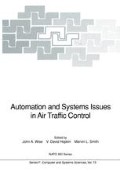Abstract
Discussion of the effects of automation in air traffic control requires an understanding of automation, the air traffic control environment, and the human operator. Without an understanding of what automation can and cannot do, it is impossible to know how it will affect the work environment. Likewise, without a clear understanding of the tasks, jobs, and goals of air traffic control, one can neither determine whether automation is appropriate nor comprehend the effects that automation will have on the work. It also requires an understanding of human abilities and limitations, preferences and biases, perceptions and cognitions. But without understanding automation and the air traffic control task, an expert in human performance can, at best, provide only vague predictions and generic warnings about how the human operator will respond to automation in air traffic control.
Access this chapter
Tax calculation will be finalised at checkout
Purchases are for personal use only
Preview
Unable to display preview. Download preview PDF.
References
Butera, F. and Thurman, J. E. (1984). Automation and Work Design. New York: Elsevier Science Publishing.
Danaher, J. W. (1980). Human error in ATC systems operations. Human Factors, 22, 535–545.
Ephrath, A. R., and Young, L. R. (1981). Monitoring vs. man-in-the-loop detection of aircraft control failures. In J. Rasmussen and W. B. Rouse (Eds.), Human Detection and Diagnosis of System Failures. New York: Plenum Press.
Hopkin, V. D. (1970). Human factors in the ground control of aircraft. NATO AGARDograph No. 142, AGARD-AG-142–70.
Mackworth, N. H. (1948). The breakdown of vigilance during prolonged visual search. Quarterly Journal of Experimental Psychology, 1, 5–61
Perrow, C. (1984). Normal Accidents: Living with High Risk Technologies. New York: Basic Books.
Pew, R. W. (1969). Comments on ‘promotion of man’: Challenges in socio-technical systems; designs for the individual operator. In E. O. Attinger (Ed.),Global Systems Dynamics. Munich/New York: Karger.
Sheridan, T. B. and Johansen, G. (1976). Monitoring Behavior and Supervisory Control. New York: Plenum Press.
Weiner, E. L., and Curry, R. E. (1980). Flight deck automation: Promises and problems. Ergonomics, 23, 995–1012.
Wickens, C. D. (1984). Engineering Psychology and Human Performance. Columbus, OH: Charles Merrill Publishing.
Wickens, C. D., and Kessel, C. (1980). The processing resource demands of failure detection in dynamic systems. Journal of Experimental Psychology: Human Perception and Performance, 6, 564–577.
Author information
Authors and Affiliations
Editor information
Editors and Affiliations
Rights and permissions
Copyright information
© 1991 Springer-Verlag Berlin Heidelberg
About this paper
Cite this paper
Goettl, B.P. (1991). Attention, Workload, and Automation. In: Wise, J.A., Hopkin, V.D., Smith, M.L. (eds) Automation and Systems Issues in Air Traffic Control. NATO ASI Series, vol 73. Springer, Berlin, Heidelberg. https://doi.org/10.1007/978-3-642-76556-8_29
Download citation
DOI: https://doi.org/10.1007/978-3-642-76556-8_29
Publisher Name: Springer, Berlin, Heidelberg
Print ISBN: 978-3-642-76558-2
Online ISBN: 978-3-642-76556-8
eBook Packages: Springer Book Archive

